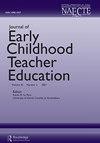评估使用研究综述:对幼儿教育工作者为数据知情决策做准备的影响
IF 1.3
Q3 EDUCATION & EDUCATIONAL RESEARCH
Journal of Early Childhood Teacher Education
Pub Date : 2023-09-11
DOI:10.1080/10901027.2023.2257157
引用次数: 0
摘要
本文章由计算机程序翻译,如有差异,请以英文原文为准。
A review of research on assessment use: implications for preparing early childhood educators for data-informed decision-making
ABSTRACT The article describes a systematic review of 109 studies using the data-informed decision-making framework to understand the sources of assessment data and the main purposes for assessment use among early childhood educators. Findings revealed assessment use is driven by the purposes of measuring and monitoring children’s learning and development, informing instructional next steps, communicating with caregivers, and identifying students for early intervention. Standardized assessments of multiple domains, teacher observations, student work samples, and student background information emerged as key sources that inform decision-making. We noted several factors that likely influence teachers’ assessment use to consider in preparing teachers for DIDM. We describe these considerations in terms of structural-, teacher-, child development, and assessment tool-related influences. Early childhood assessment use is different from primary or secondary contexts that largely inform the DIDM literature. We conclude with implications for preparing educators’ DIDM by presenting six skillsets to foster their ability to engage in critical thinking about standardized assessments, engage in intentional observation, generate high-quality data, engage caregivers as consumers and sources of data, use multiple data sources for early intervention identification, and advocate against accountability-driven DIDM.
求助全文
通过发布文献求助,成功后即可免费获取论文全文。
去求助
来源期刊

Journal of Early Childhood Teacher Education
EDUCATION & EDUCATIONAL RESEARCH-
CiteScore
2.20
自引率
16.70%
发文量
27
期刊介绍:
The Journal of Early Childhood Teacher Education, the official journal of the National Association of Early Childhood Teacher Educators, publishes original manuscripts, reviews, and information about association activities. Its purpose is to provide a forum for consideration of issues and for exchange of information and ideas about research and practice in early childhood teacher education. JECTE welcomes research reports, position papers, essays on current issues, reflective reports on innovative teacher education practices, letters to the editor and book reviews.
 求助内容:
求助内容: 应助结果提醒方式:
应助结果提醒方式:


